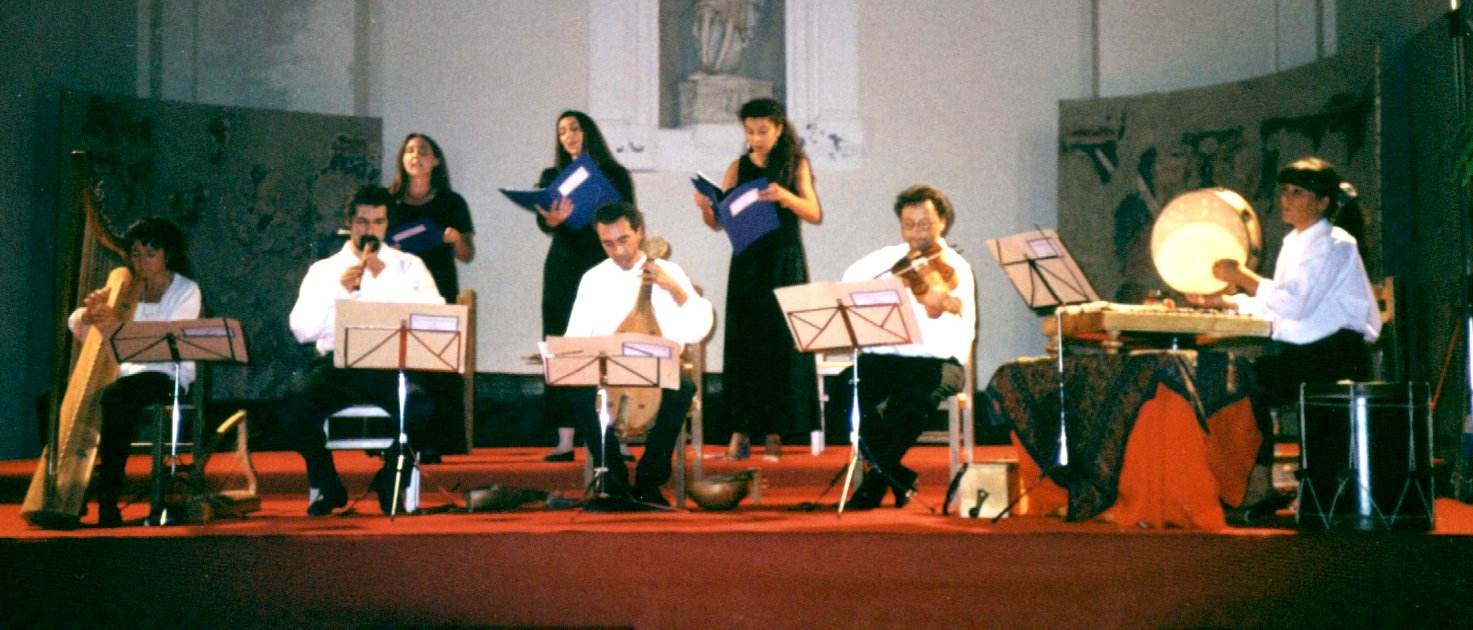
The Ensemble "Chominciamento di gioia" is named after an "istampitta", a 14th century Italian dance. The Ensemble's aim is the diffusion of European Medieval and Renaissance music. It gives special attention to the Italian vocal and instrumental entertainment repertoire, which is presented with particular respect for the original texts and at the same time an awareness of modern standards of musical enjoyment. The "Chominciamento di gioia" musicians make recordings with labels as Deutsche Grammophon, EMI, Virgin, Deutsche Harmonia Mundi, Symphonia, Stradivarius, Tactus, K617, III Millennio, Musicaimmagine records, etc.. The Ensemble play on modern copies of instruments used between the 12th and the 14th centuries, which are based on scholarly studies of originals and on pictorial representations of the period, taking into account what is known of their use at particular places and times. The Ensemble have toured Italy and Spain extensively in concert, and have played incidental music for drama of the Renaissance and the Middle Ages. They have recorded sound tracks for documentaries, exhibitions and the CDs "Peccatori e Santi", "Farai un vers desconvenent", "Codex Bamberg", "Francesco Landini, ballate", "Rosa das Rosas, the symbol of the Rose in Middle Ages", "Istampitte, italian medieval dances" and "In vinea mea, wine, grape vines and vineyards in the Middle Ages". They have made many radio and television broadcasts for RAI and Mediaset (Italy), Radio Nacional de España, Radio France, ORF (Austria) and national radio companies of Italy, France, Spain, Belgium, Austria, Portugal, Finland, Japan, USA, Korea, Turkey, Greece, Estonia, Denmark. In December 1997 they played in the Christmas Concert, broadcast world wide by the Italian television channel Canale 5 from the Sala Nervi in Rome. Their work in modern media include music for the commentary on the CD-ROM "L'Età dei Castelli" and the CD "Futuro Antico" recorded for EMI with the Italian pop singer Angelo Branduardi. Source: Cominciamento di Gioa
|
|
|
Selection
(The Ensemble also considers specific requests and programmes on commission)
"Jacobe Sancte"
the pilgrimage to Santiago de Compostela
(vocal and instrumental: 12 performers) listen live recording
"Principio di virtù"
"Istampitte", "saltarelli", "trotti": all the
Italian dances of the 14th century retrieved from a manuscript preserved in the British Museum.
(instrumental: 5 performers) CD
"Imperayritz de la ciutat joyosa"
Programme of musical literature of Marian devotion from the 12th to the
14th century, from popular forms to the most refined cultured music.
(vocal and instrumental: from 6 to 9 performers)
"Peccatori e santi"
Sacred love and popular feeling in the Italian and
Spanish "laudari" of the 13th century.
(vocal and instrumental: from 6 to 14 performers) CD
"Rosa das rosas"
The rose as symbol in the sacred and profane musical literature of the
medieval west.
(vocal and instrumental: 8 performers) CD
"In vinea mea"
wine, grape vines and vineyards in the Middle Ages.
(vocal and instrumental: from 9 to 12 performers) CD
"Mia Yrmana fremosa"
women in the Middle Ages.
(vocal and instrumental: 6 performers)
"Puncta"
A panorama of European dances related to the "estampie" form,
principal model of instrumental music from the 13th and 14th centuries.
(instrumental: 5 performers)
"O Mystress mine"
Shakespeare's dramas stage music in the Queen Elisabeth times.
(vocal and instrumental: 8 or 9 performers)
"Farai un vers desconvenent..."
The wanton Middle Ages: from the affected obscenities of the troubadours to
the student licentiousness of "Carmina Burana" to the uninhibited
mixture of sacred and profane in some of the "Cantigas de S. Maria".
(vocal and instrumental: 7 or 8 performers)
"Robins m'aime"
Robin and Marion, principal characters of the 13th century "pastourelle",
in the "jeu" of A. de la Halle and the poliphony of the codices of Bamberg
and Montpellier.
(vocal and instrumental: 8 performers)
"O Roma nobilis"
The ways of pilgrimage: devotion songs of the first Jubilee time.
(vocal and instrumental: 8 or 11 performers)
|
|
"Chominciamento di gioia" ensemble uses instruments after originals (XII - XIV centuries)
strumenti a corde sfregate: vielle, ribeca, lira, giga, symphonia.
strumenti a pizzico: liuto, oud, saz, arpe di varia taglia, arpa doppia, salteri a pizzico, rota.
strumenti a fiato: flauti dritti e traversi, cialamelli, corni
strumenti a percussione: salterio a martelli, campane, naqqara, tamburi a cornice con e senza sonagli, tamburi a bacchette, crotali, nacchere, darabouka, sonagliere, edoufe
|
|
|
Peccatori e santi
Codex Bamberg (with Camerata Nova)
Futuro Antico (with Angelo Branduardi))
Farai un vers desconvenent
L'Età dei Castelli (CD.Rom)
Francesco Landini - Ballate - (with Camerata Nova)
Rosa das Rosas
Istampitte (Italian Dances of the Middle Ages)
In vinea mea
|
|
|
Listen to Chominciamento di Gioia
|
Chominciamento di gioia
c/o Gianfranco Russo, via Giovanni Caselli 11 (C 9), 00149 Roma, Italy
tel/fax: (++39) 338 1115751 , eMail
|